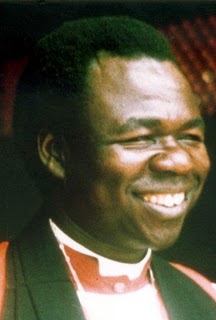
Martyr of Uganda
Janani was a teacher, when he found Christ, and became an enthusiastic evangelist. From 1949 he studied theology at Buwalasi College and was ordained in 1956. As Uganda gained independence from Britain, Luwum was noted as a rising indigenous leader in the church.
His progress was impressive: after studying in England, he became principal of Buwalasi. September 1966, he was appointed Provincial Secretary of the Church of Uganda, Rwanda, Burundi and Boga-Zaire, a difficult position at the time. Luwum won a reputation for creative and active leadership, promoting a new vision with energy and commitment. He was consecrated bishop of the newly-formed Diocese of Northern Uganda 3 years later, in the presence of Prime minister Milton Obote, and Army Chief of Staff, Idi Amin. Janani was appointed to the Anglican Consultative Council and served on the Central Committee of the World Council of Churches.
1971: Idi Amin seized power in a military coup, arresting anyone not supporting him. Hundreds of soldiers from the Lango and Acholi tribes were massacred. Amin ordered the expulsion of the Asian population of Uganda, 55,000 people. Over the next few years, many Christians were killed for various offences. International observers and human rights groups estimate between 100,000 - 500,000 people were killed under Idi Amin’s regime.
In 1974 Janani was elected archbishop of Uganda and made a lasting impression on those attending the Lausanne Congress on World Evangelisation. In 1977 Bishop Festo Kivengere preached on "The Preciousness of Life" to an audience including many high government officials, denouncing the killings, accusing the government of abusing the authority God had entrusted to it. On 5 February there was a raid on the home of Archbishop Janani Luwum, to 'search for hidden stores of weapons'. The Archbishop called on President Amin delivering a note of protest at the arbitrary killings and disappearances. Amin accused the Archbishop of treason, producing a document supposedly by former President Obote attesting his guilt, and had the Archbishop and two Cabinet members (both committed Christians) arrested and held for military trial. The 3 met briefly with 4 other prisoners awaiting execution, praying with them briefly. Then they were put in a Land Rover and not seen alive again. The government story - they died in a car accident. His body was placed in a sealed coffin and sent to his native village for burial. The villagers opened the coffin and discovered bullet holes. It is believed that he was murdered on Idi Amin's orders.
The government forbid a funeral service. But 4,500 people gathered at the cathedral on Namirembe Hill, on the following Sunday. The singing began with the hymn associated with the martyrs of Uganda of 1885-86, “Daily, daily sing the praises”. This was caught up by the crowds, until the hill rang with the sound of the victory song, sung again and again.
The following June, 25,000 Ugandans came to the capital to celebrate the centennial of the first preaching of the Gospel in Uganda, among them many who had abandoned Christianity, but returned to their Faith as a result of seeing the courage of Archbishop Luwum and his companions in the face of death.
Idi Amin the “Butcher of Uganda” was ousted from power in 1979 by an invasion from Tanzania. He died in 2003.
BORN: c. 1922,
Kitgum District, Northern Uganda
DIED: 17 February 1977 (aged 55),
Kampala, Uganda
 Welcome
Welcome Calendar
Calendar Today's Word
Today's Word Lauds
Lauds Terce
Terce Sext
Sext None
None Vespers
Vespers Compline
Compline Matins
Matins